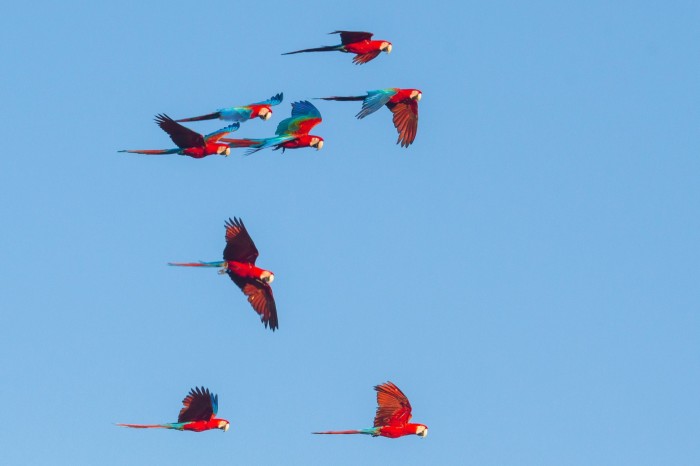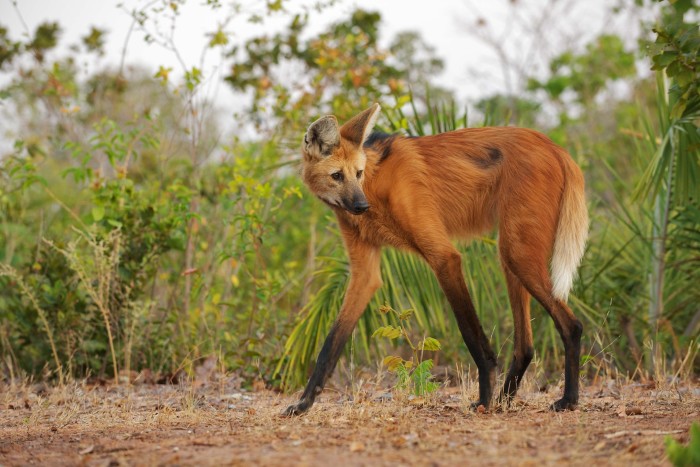Unlock the Editor’s Digest for free
Roula Khalaf, Editor of the FT, selects her favourite stories in this weekly newsletter.
We stopped the jeep and listened. We were searching for Nhorinha, a female maned wolf. My guide, Isabela Meniz, turned the antenna to try to catch a signal from the animal’s tracking collar. The faint beeping sound grew louder then faded. The wolf was on the move, somewhere in the gathering dusk.
This was her territory, deep in the heart of the cerrado, a savannah of dry grasslands that is South America’s second largest biome after the Amazon. When the BBC’s Planet Earth team wanted to film an iconic species for their “Deserts and Grasslands” episode, they came here to Fazenda Trijunção, to track the elusive maned wolf. An 81,000-acre conservation project, Trijunção is home to a delightful pousada, or inn, where naturalist guides take guests out into the savannah to see its astonishing bird life, and hopefully the maned wolves that are one of the stars of this week’s episode of Planet Earth III.
In Brazil, the cerrado is the country’s vacant heart, a grassland of long horizons and huge skies. You can go for miles here without seeing anyone. When I asked Isabela why she loved it here, she answered simply: “The silences.”

It was always an unconsidered back country of old ranches, or fazendas, of lives framed by hardship and plaintive country music. But now it has become a landscape under threat, on the front line of habitat loss, as vast tracts of the cerrado are being subjugated to large-scale agriculture — chiefly the monoculture of soyabeans — at over twice the rate of the Amazon. Some experts predict it could disappear completely in the next 10 years.

For now, the cerrado remains home to a profusion of flora and fauna. I watched as birds danced across the grasslands like an unending chorus line; there are 283 species at Trijunção and the names reflect their glamour — the helmeted manakin, the glittering-throated emerald, the fork-tailed woodnymph, the point-tailed palmcreeper, the screaming cowbird and red-cowled cardinal.
Among the mammals are the anteater, jaguar, ocelot and pampas deer. But it is the maned wolf, one of South America’s rarest mammals, that draws processional naturalists and tourists alike. It is a supermodel of the animal kingdom, the most beautiful of canids, shy, slender, fine-boned, with a golden coat and long legs. It would make a leopard look clumsy.

Conservation efforts at Trijunção include a wildlife breeding program, small-scale sustainable ranching, fruit orchards and experimental projects to find crops that suit the soil and the climate without degrading the habitat. Low-impact tourism is at the heart of the project; visitors bring employment to the locals and value to the conservation of wildlife.
With the retro feel of an old-fashioned ranch house, Pousada Trijunção is an elegant rustic lodge, all salvaged wood and rich South American fabrics. There is a kitchen producing a flow of hearty meals, a small bar serving excellent caipirinhas and a swimming pool where you can pass long afternoons dreaming of wolves.

Listed in most compendiums as endangered due to habitat loss, the maned wolf are secretive creatures, ghosting through the undergrowth. The Brazilian conservation charity, Onçafari, which has a base at Trijunção, tracks them to better understand their movements, lives and challenges. Morning and evening I went out with two of the charity’s young naturalists in their open safari jeep, hoping for a glimpse of the Greta Garbo of the natural world.
Nhorinha is the alpha female of the fazenda territory. Hers has been a complicated existence that reads rather like a soap opera — serial mates, estranged offspring. Though most maned wolf are monogamous, Nhorinha refuses to be tied down by the wolf patriarchy. She is known to have taken at least three mates, much to the approval of the naturalists who track her.

Rumours about her seemed to have a life of their own, like celebrity gossip — that she had returned to a previous mate; that one of her female offspring was consorting with one of her previous males; that she was pregnant, father unknown; that she was dead, some unfortunate accident. We spent three hours tracking her, listening to the crescendo of beeps, then losing her again, doubling back, scanning the grasslands with binoculars, feeling just a tad like celebrity stalkers.
And suddenly she was there, as we came round a bend — trotting across the track, as elegantly as a ballerina crossing a stage. She paused and turned her head to look at us. She was beautiful. But in that moment I wondered what she saw when she looked back at us, the silhouette of the jeep against the last light, the figures inside scrambling for their cameras and binoculars.
Then she was gone, the tip of her white tail disappearing into the long grass, a determined survivor in this most extraordinary of landscapes.
Details
Stanley Stewart travelled to Pousada Trijunção as a guest of Niarra Travel (niarratravel.com); double rooms cost from about Rs3,500 (£575) per night. The ‘Planet Earth III’ episode, ‘Deserts and Grasslands’, featuring the maned wolf, will be broadcast on Sunday, November 5, on BBC One and iPlayer
Stay connected with us on social media platform for instant update click here to join our Twitter, & Facebook
We are now on Telegram. Click here to join our channel (@TechiUpdate) and stay updated with the latest Technology headlines.
For all the latest Travel News Click Here
